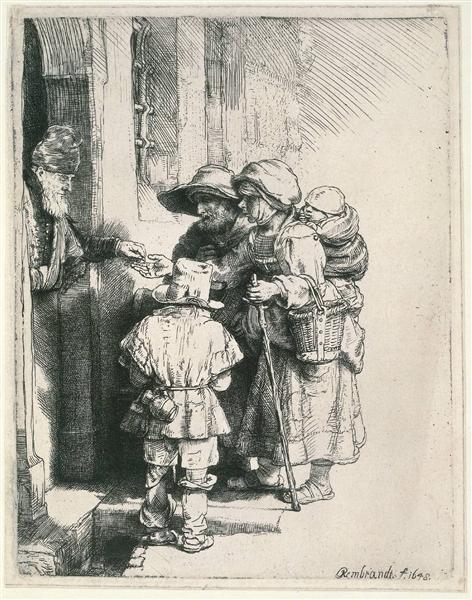Description
The work "Mendigos at the gates of a house" (1648) by Rembrandt Van Rijn offers us a deep introspection to the soul of the human condition, subtly revealing its mastery in the representation of light and shadow. This oil on canvas is within the context of the Dutch Baroque, where the game of dramatic lights and the attention to detail are defining characteristics, but in this painting, Rembrandt goes further, capturing the fragility and dignity of the human being in situations of vulnerability.
The composition of the painting revolves around an entrance, where there are two figures of beggars in the foreground, arranged in the threshold of a house whose architectural details are subtly suggested in the gloom. The absence of a clearly defined background focuses on the viewer's attention on the protagonists of the work. The position of the beggars, with one slightly inclined forward and the other reclining, suggests both a waiting status and plea, generating instant empathy. Their clothing, scruffy and wrinkled, show the wear of their daily lives, and the treatment of folds and textures manifests itself in the delicate brushstroke that characterizes Rembrandt's style, highlighting its technical skill.
The use of light is fundamental in this work. Rembrandt uses a subtle tenebrism, where the light seems to emerge from the dark, partially bathing the figures of the beggars and providing an almost supernatural effect to the composition. This light not only gives life to the figures, but also symbolizes hope amid desolation. Faces, despite the hardness of their condition, are illuminated in such a way that they transmit emotional complexity. Examining facial expressions, it is possible to perceive a mixture of resignation and yearning, which invites a reflection on the inherent dignity of all individuals, regardless of their social situation.
The contrast in the color palette is also remarkable. The terrible and dull tones predominate in the clothes of the beggars, while the darkest background highlights its figures. This use of color not only echoes realism that characterized Rembrandt, but also emphasizes the emotional drama present in the scene.
Throughout his career, Rembrandt explored issues of humanity and spirituality, but this painting particularly encapsulates its interest in vulnerability. In an artistic context where the idealization of the subject was common, "beggars at the doors of a house" departs from this approach, opting for a portrait of raw reality. This work can be seen as a precursor to the social painting of the nineteenth century, where the representation of poverty and marginalization would take a central place in the artistic narrative.
In terms of similar contemporary works, the representations of the daily life of their contemporaries can be mentioned, as well as the portraits of marginal figures in the work of other baroque artists. However, none of these works manages to capture the essence of the human condition with the same emotional depth that Rembrandt achieves in this composition.
In short, "beggars at the gates of a house" is more than a simple representation of beggars; It is a visual testimony of the complexity of the human being. Through its masterful use of light, texture and expression, Rembrandt invites us to look beyond the surface, urging us to consider not only the external struggle of its characters, but the richness of the human soul that lasts even in the adversity. This work, for its commitment to empathy and its technical virtuosity, remains a focal point in the study of Baroque art and the understanding of human nature throughout art history.
KUADROS ©, a famous paint on your wall.
Hand-made oil painting reproductions, with the quality of professional artists and the distinctive seal of KUADROS ©.
Reproduction service paintings With a guarantee of satisfaction. If you are not completely satisfied with the replica of your painting, we refund your money 100%.

